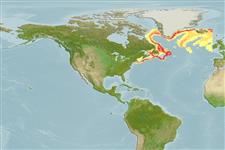Common names from other countries
Пластиножаберные (акулы и скаты) (sharks and rays) >
Rajiformes (Skates and rays) >
Rajidae (Skates)
Etymology: Amblyraja: Greek, amblys = darkness + Latin, raja, -ae = ray (Raja sp.) (Ref. 45335).
Issue
Provisionally retained as valid but treated as junior synonym of A. hyperborea by Weigmann (2016, Ref. 106604) due to strong morphological similarity and preliminary molecular data. Further work is needed to resolve this issue (Ref. 118749).
Environment: milieu / climate zone / depth range / distribution range
экология
морской батидемерсальный; пределы глубины 165 - 3000 m (Ref. 114953). Deep-water; 67°N - 39°N, 72°W - 10°W (Ref. 114953)
Western Atlantic: Nova Scotia, Canada to southern New England, USA; Eastern Atlantic: Iceland (Ref. 12462); North Atlantic: Labrador Sea and off British Isles (Ref. 114953)
Size / Вес / Возраст
Maturity: Lm ? range ? - ? cm
Max length : 74.3 cm TL самец/пол неопределен; (Ref. 4926); 85.0 cm TL (female)
Краткое описание
определительные ключи | морфология | морфометрия
Lacks large thorns on anterior margins and mid posterior parts of pectorals and on either side of mid-dorsal ridge on the disc. Upper surface plain light brown, either grayish or of chocolate hue, darker along margins of fins. Lower surface brownish gray, grayish white or perhaps pure white (Ref. 6902).
Benthic (Ref. 58426). Deep-water species. Prefers higher temperatures. Feeds on small fishes and crustaceans (Ref. 6902). Oviparous (Ref. 50449). Eggs have horn-like projections on the shell (Ref. 205). Maximum depth reported taken from Ref. 117245. It may be captured as by-catch in deep water fisheries, but due to its depth preference, it is less likely to be vulnerable (Ref. 117245).
Life cycle and mating behavior
Maturities | размножение | Spawnings | Egg(s) | Fecundities | личинки
Oviparous, paired eggs are laid. Embryos feed solely on yolk (Ref. 50449). Eggs have horn-like projections on the shell (Ref. 205).
McEachran, J.D. and K.A. Dunn, 1998. Phylogenetic analysis of skates, a morphologically conservative clade of elasmobranchs (Chondrichthyes: Rajidae). Copeia 1998(2):271-290. (Ref. 27314)
Статус Красного Списка МСОП (Ref. 130435)
CITES (Ref. 128078)
Not Evaluated
Угроза для людей
Harmless
Использование человеком
дополнительная информация
инструменты
Специальные отчеты
Скачать в формате XML
ресурсы в Интернет
Estimates based on models
Preferred temperature (Ref.
115969): 3.1 - 4, mean 3.6 (based on 69 cells).
Phylogenetic diversity index (Ref.
82804): PD
50 = 0.5010 [Uniqueness, from 0.5 = low to 2.0 = high].
Bayesian length-weight: a=0.00302 (0.00141 - 0.00645), b=3.24 (3.07 - 3.41), in cm Total Length, based on LWR estimates for this (Sub)family-body shape (Ref.
93245).
Trophic level (Ref.
69278): 3.7 ±0.57 se; based on food items.
устойчивость к внешним воздействиям (Ref.
120179): низкий, минимальное время удвоения популяции 4.5-14 лет (Fec assumed to be <100).
Fishing Vulnerability (Ref.
59153): Moderate to high vulnerability (54 of 100).
